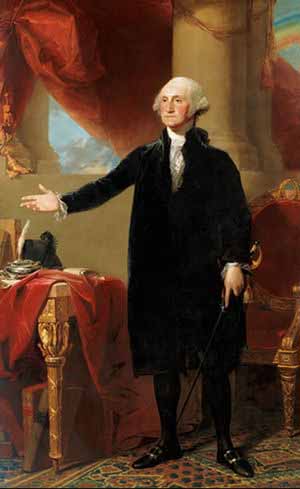
Dear Avid Blog followers,
I have let you down. I know this.
Unfortunately I have no good excuse, but if you would like a bad one, please email me or write on my Facebook wall. Like all mistakes in history, I figure the past can be the past and we can all move on. Forgive and forget, right? Resuming with our previous series of American Presidents, I bring you…
Thomas Jefferson: Father of the Declaration of Independence, Father of the University of Virginia, and Father of a few Children from his Slaves
First off, I have to admit something. While TJ undoubtedly contributed a lot to the founding of our country, and he was a clear “Renaissance Man” of his generation, he is not one of my favorite Founding Fathers. ::GASP:: I’m sorry to all UVA alumni and to all you TJ lovers out there, but I feel the man is slightly overrated in terms of his presidency and overall contributions. Yes Alison, I know he was one of America’s first oenologists, and I know he could leap tall buildings in a single bound (not to mention being the Father of the Tomato in a sense, since he was one of the only people of his time to trust red foods not to be poisonous). So instead of focusing on all his accomplishments, since most people know about those, I am going to pick and choose some instances of where I can do some historical constructive criticism. But I’ll end on a good note, don’t worry. Onward ho’s!
My first scruple with Jefferson is with his military leadership. As Governor of Virginia from 1779-1783, Jefferson presided over the state’s first invasion by the British during the Revolutionary War. Not an easy position for anybody when a foreign enemy attacks, just ask the Romans in 410 when Rome was sacked by the Visigoths. My critique is that Jefferson, instead of raising an army and organizing local militias, sat and hoped that Virginians would come together by themselves to defend their homeland. Virginia was invaded by the traitor Benedict Arnold and then Lord Cornwallis later. Cornwallis later got what was coming to him at Yorktown, so I won’t dwell at this. The same libertarian view cost TJ’s successor dearly during the War of 1812. James Madison inherited a Navy consisting of about 20 small boats, and an army of less than 12,000 untrained soldiers, compared to the Royal Navy of over 600 war vessels and the biggest army in the world. Jefferson’s downsizing of the military showed that there is such a thing as limiting government too much.
TJ’s wife Martha died at a young age (32), and Jefferson went into serious depression. As is evident from his letters with her (and the movie/musical 1776) they were very much in love. The primary architect of the Declaration, delegate to the Continental Congress, and Governor of Virginia got himself appointed Minister to France and gallivanted around Paris for a few years. During this time it is speculated that he begun his long-term relationship with his slave Sally Hemmings. While that may have been a long-term physical fling, Jefferson undoubtedly used his time there to cure his depression by falling in and out of love. I will give Jefferson props during this time for writing of my favorite writings, my head and my heart, a love dialogue between his reason and his lust for a married English woman named Maria Cosway. Jefferson, therefore, was not a part of the Constitutional Convention in Philadelphia, but chose to keep in touch with the proceedings through his good friend, James Madison. Jefferson returned stateside in 1789 to be the first Secretary of State to President Washington.

As President, Jefferson made a huge etiquette blunder that almost made the War of 1812 the War of 1803… ok a little extreme but it definitely did not help to ease tensions between Britain and the U.S. Anthony Merry became the new Ambassador to the U.S. from Britain and was invited to the White House for dinner. Jefferson, deciding it was not a big deal and striving to be a man of the people, greeted the new ambassador in his pajamas infuriating Merry and causing him to denounce the Americans as uncivilized. Imagine Mr. Obama greeting the British Prime Minister in his pajamas with a gift of American DVDs (now that’s only half true). The “Merry Affair” created an unnecessary diplomatic nightmare for Secretary of State James Madison and his wife Dolley who was a surrogate first lady and unofficial social secretary who ended up dealing with the ramifications of the incident for years. Several other etiquette no-no’s that Jefferson chose to ignore showed his disdain for simple etiquette and pride.
Lastly, I have some qualms with what Jefferson preached and what he practiced. Namely his inconsistency with slavery. Jefferson wrote in his draft of the Declaration that all men were created equal and specifically mentioned those bound in servitude. This provision was stricken in the final compromise. However, in his will, Jefferson did not free any of his slaves. Because of his reckless spending and enormous debts, Jefferson’s slaves were sold upon his death to settle his debts. This, to me, represents a serious character flaw with Jefferson that is sometimes overlooked.

Jefferson contributed greatly to the founding of our country, architecture, science, political philosophy, and history. Let’s not forget he also made the Louisiana Purchase that more than doubled the size of the country. However, his lack of humility and sense of entitlement often caused unnecessary problems and, for me, demonstrates his serious flaws. I didn’t even mention his Embargo Act of 1807 that was so unpopular and damaging to American business, it was repealed by the end of his second term, and his falling out with John Adams. It’s not that I don’t think TJ was a good president and want to gloss over his accomplishments. I simply want to point out that there were serious mistakes Jefferson made and should not be overlooked.
Next up, one of my personal favs….









